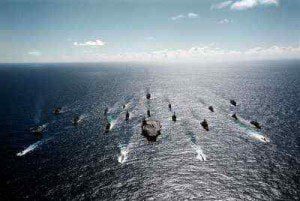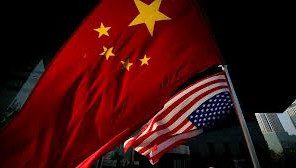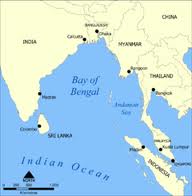 US secretary of Navy Ray Mabus paid a ‘silent’ but significant visit to Dhaka. There are two aspects regarding the media attention to this news — one, this visit got less attention than it actually deserved and then, it got better attention in foreign news agencies than the news agencies of Bangladesh. On the contrary, this visit has a huge significance if we consider the developments that have been taking place in South Asia and in South East Asia for last few months. Almost a month before a news jolted the ministry of foreign affairs in Bangladesh. This news was regarding harbouring of US Seventh Fleet in Chittagong. An Indian news agency claimed that the US had proposed Bangladesh to harbour its Seventh Fleet in Chittagong. But Bangladesh completely refuted the claim. Now, how should this visit be taken in the backdrop of such complex developments?Let’s have some glimpses of the last visit paid by the US secretary of Navy. An eight-member US delegation, led by Ray Mobus, called on Chief of Naval Staff Vice Admiral Zahir Uddin Ahmed and later on the Prime Minister Sheikh Hasina. During the meeting with the Vice Admiral they exchanged pleasantries and discussed matters on professional interest. Acquiring warship and ultra modern ocean survey ship from USA and assistance in the field of professional training also came up in the discussion. Sheikh Hasina said her government wants the Bangladesh Navy to extract marine resources following the judgment on maritime dispute over Myanmar. The prime minister also stressed the need for strengthening cooperation between the naval forces of Bangladesh and US. Mobus also laid emphasis on strengthening cooperation between the naval forces of Bangladesh and US. Was there any other agenda behind the façade of formalities?
US secretary of Navy Ray Mabus paid a ‘silent’ but significant visit to Dhaka. There are two aspects regarding the media attention to this news — one, this visit got less attention than it actually deserved and then, it got better attention in foreign news agencies than the news agencies of Bangladesh. On the contrary, this visit has a huge significance if we consider the developments that have been taking place in South Asia and in South East Asia for last few months. Almost a month before a news jolted the ministry of foreign affairs in Bangladesh. This news was regarding harbouring of US Seventh Fleet in Chittagong. An Indian news agency claimed that the US had proposed Bangladesh to harbour its Seventh Fleet in Chittagong. But Bangladesh completely refuted the claim. Now, how should this visit be taken in the backdrop of such complex developments?Let’s have some glimpses of the last visit paid by the US secretary of Navy. An eight-member US delegation, led by Ray Mobus, called on Chief of Naval Staff Vice Admiral Zahir Uddin Ahmed and later on the Prime Minister Sheikh Hasina. During the meeting with the Vice Admiral they exchanged pleasantries and discussed matters on professional interest. Acquiring warship and ultra modern ocean survey ship from USA and assistance in the field of professional training also came up in the discussion. Sheikh Hasina said her government wants the Bangladesh Navy to extract marine resources following the judgment on maritime dispute over Myanmar. The prime minister also stressed the need for strengthening cooperation between the naval forces of Bangladesh and US. Mobus also laid emphasis on strengthening cooperation between the naval forces of Bangladesh and US. Was there any other agenda behind the façade of formalities?
Bangladesh’s location in the basin of Bay of Bengal gives it a much weight to be an important country in the region. Bay is the largest bay in the world which forms the northeastern part of the Indian Ocean. The maritime region in the Bay of Bengal encompassing the countries around the littoral of the Bay, always maintained a thriving contact through the movement of trade, people, religious, cultural and political missions, which gave the region a unique character. Since it is known that in a historic victory at the UN maritime tribunal, Bangladesh has won territorial and economic rights to the vast Bay of Bengal resources even beyond it bargained for. This achievement has given Bangladesh an upper hand to strengthen its position strategically, economically, to some extent, politically in South Asia and in a broader sense in international stage. The Bay of Bengal is more significant in regards to its location in the Indian Ocean. According to Robert D Kaplan, Indian Ocean will be the centre of global conflicts, because most international business, supply will be conducted through this route. Most important of all, it is in the Indian Ocean that the interests and influence of India, China and the United States are beginning to overlap and intersect. It is here, as Kaplan says, that the 21st century’s “global power dynamics will be revealed.” According to Kaplan two key players in this region are India and China. India is moving east and west while China to the South. Interestingly these, relatively new political players are making the Indo-Pacific into a heaven of “RealPolitik.” And lone Superpower the US is also on a process to shift its focus from the Middle East to this region.
Historically Bay of Bengal was an important route for ancient trade and commerce and this has been continued to till date. The strategic interest of global powers has added some new dimensions to this particular region. More importantly the government of Bangladesh is now considering the urgency of securing the Bay of Bengal to secure the national interest there. The natural resources, i.e. petroleum carbon, marine fisheries of the Bay of Bengal are component of future economic development of Bangladesh. Frequently we find in national dailies reporting that infiltration of foreign fishermen is illegally taking place within the jurisdiction of Bangladesh. And Bangladeshi coast guards are helpless as they couldn’t reach deep water with their age old boats to chase the infiltrators.. Though lately, but still something to be optimistic about that the government of Bangladesh has taken some initiatives to modernise its Navy. The Government of Bangladesh announced an ambitious defense procurement plan in February 2009 for a major purchase of weaponry, equipment and hardware for its armed forces, including anti-tank and anti-ship missile systems, aircraft for maritime patrol, frigates, tanks and helicopters to turn the force into a ‘three dimensional force.’
The US will find it viable to join the process of modernisation of Bangladesh Navy by providing it with training, selling their ‘outmoded’ equipment and forging relationship to a new height. This will help the US Navy to come closer to Bangladesh Navy. To get an upper hand in the Indian Ocean Bangladesh is a good option just after India. There is already a bonhomie relationship between India and Bangladesh and no exception, concerning India and the US. Therefore, India also won’t mind to bring Bangladesh into the ‘circle’ of ‘friends.’ India and the US would like to see Bangladesh out of ‘string of pearls.’ From the Bangladesh’s point of view this is a good development to get some ‘big friends’ besides and enjoy some benefits. In near future, probably Bangladesh will continue to receive more foreign high-ups. But at the same time it has to be very much conscious while dealing them. There has to be a policy of balancing. Tilting towards a particular country would be a blunder. So, in conclusion it can be said that a ‘tricky’ and testing time ahead for foreign policy decision makers in Bangladesh and we can only wish that they will prove their ‘character’ for Bangladesh’s national interest.
The writer is Editor, Foreign Affairs Insights & Reviews.
Source: The Daily Star







